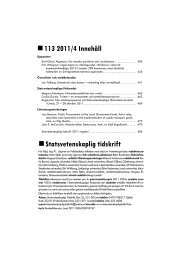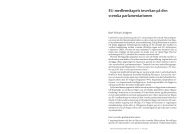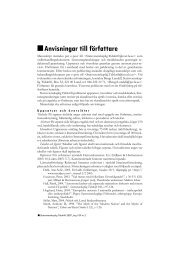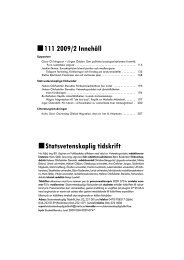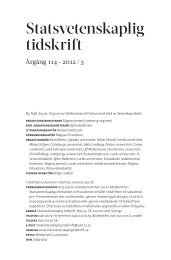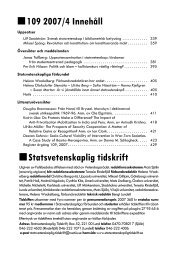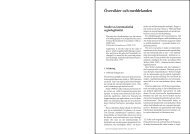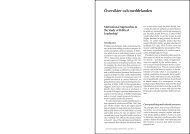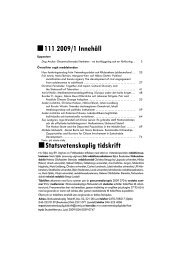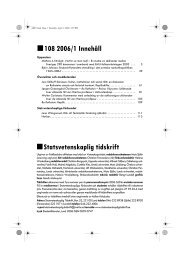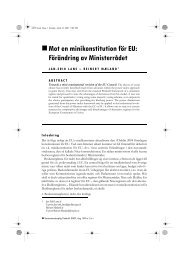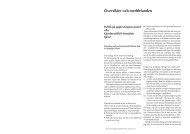Hela nummer 2007/1 (PDF, 2047 kb) - Statsvetenskaplig tidskrift
Hela nummer 2007/1 (PDF, 2047 kb) - Statsvetenskaplig tidskrift
Hela nummer 2007/1 (PDF, 2047 kb) - Statsvetenskaplig tidskrift
Create successful ePaper yourself
Turn your PDF publications into a flip-book with our unique Google optimized e-Paper software.
st071.book Page 93 Sunday, March 4, <strong>2007</strong> 5:48 PM<br />
about the role of arguably equally fundamental<br />
processes, such as citizenship and<br />
the social construction of nationalism.<br />
Given the subtleties and ambiguities in<br />
Stripple’s findings—with territoriality<br />
seen a largely reproducing the statist<br />
frame, authorization understood as largely<br />
transcending it, and securitization rendered<br />
as a mix of the two effects—the<br />
choice of the particular processual lenses<br />
used to focus our attention seems critical.<br />
Stripple concludes the work by offering<br />
the metaphor of IR theory as a tourist’s<br />
travel guide to understanding international<br />
environmental politics. He suggests that<br />
many who use the guide to study climate<br />
change and other eco-political phenomena<br />
prefer to stay close to the beaten path,<br />
deploying time-tested rationalist concepts<br />
to the study of environmental conflict and<br />
cooperation. He also suggests that those<br />
who do go trekking off the beaten path<br />
have too often failed to “write home” in<br />
the sense of re-engaging with the larger<br />
questions of IR theory and of world politics<br />
(he also cites recent work on migration<br />
in IR theory as a positive example of<br />
writing home). The metaphor is apt, but<br />
the scholar’s responsibility less clear:<br />
93<br />
Should we seek to un-write the master<br />
guide? To write a new guide? To subvert<br />
the idea of guide books and destabilize the<br />
act of guide-writing in general?<br />
Of course, different scholars will quite<br />
reasonably find different answers to that<br />
question. For Stripple, the answer is clear:<br />
we should recognize that much of our<br />
trusty guidebook is obsolete, but also that<br />
the terrain into which we are heading is<br />
not really solid ground at all—at least until<br />
we find the (temporarily) stable understandings<br />
that will make it so. Climate<br />
Change after the International does not purport<br />
to be a new guidebook, but is well<br />
worth taking along on the trip.<br />
References<br />
Kuehls, Thom, 1996. Beyond Sovereign Territory: The<br />
Space of Eco-Politics. University of Minnesota<br />
Press.<br />
Smith, Steve, 2004. “Singing Our World into<br />
Existence: International Relations Theory and<br />
September 11”, International Studies Quarterly 48,<br />
p 499-515.<br />
Wendt, Alexander, 1992. “Anarchy Is what States<br />
Make of It: The Social Construction of Power<br />
Politics”, International Organization 46, p 393-<br />
425.<br />
■ L ITTERATURGRANSKNINGAR



